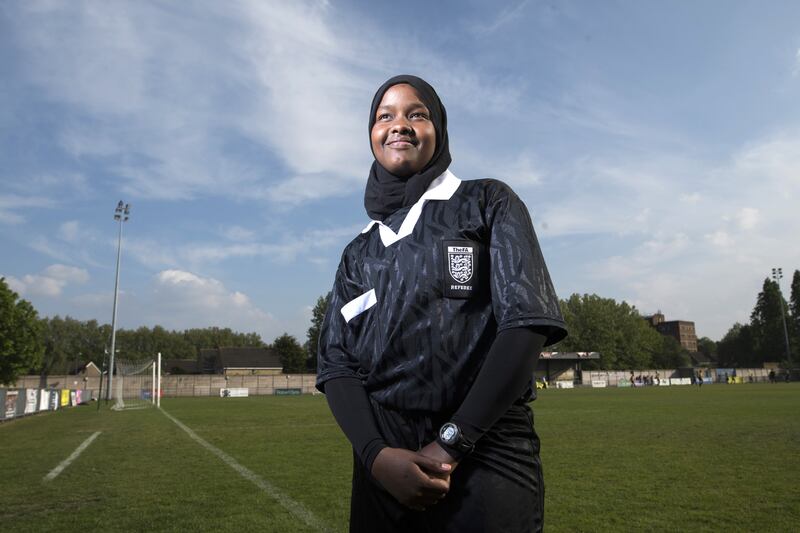A cold, cloudy Sunday morning in West London and 22 grown men are on a football pitch playing in one of the capital’s minor leagues. The standard is not particularly good but nonetheless there is something remarkable about the fixture.
As the tackles fly in, a 1.6-metre-tall figure wearing match officials' kit and a headscarf brandishes a yellow rectangular piece of plastic.
“My philosophy is that everyone deserves a chance,” Jawahir Roble, Britain's first black female Muslim referee, tells The National. “But if they keep repeating fouls, I book them.
“I like to control the game first and then I’ll use my cards. The game is not about me. It’s about them having fun and making good memories.”
The contest finishes with a 3-1 home win but, for Roble, 29, the more important result is not the score at the final whistle — it’s that the players amble over to shake her hand and say thank you. Confirmation, she says, of a job well done.
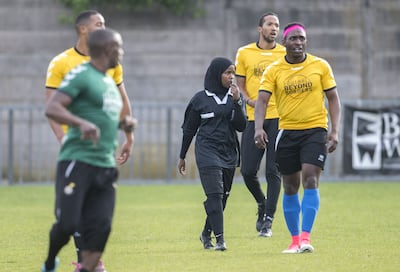
Her extraordinary achievements have been recognised with an MBE in King Charles III’s first New Year Honours List for services to the Football Association and volunteering work with the education and social inclusion charity Football Beyond Borders.
It is a feat perhaps rivalled only by the journey that has brought her to within tantalising distance of collecting the silver medal at a forthcoming investiture at Buckingham Palace.
Musing on how far she has come, Roble herself once said: “Who would ever think a black, Somali-born immigrant girl with eight siblings could ref a men’s game in England with a hijab on?”
Jawahir Jewels (JJ), as she is commonly known because of the Arabic meaning of her first name, was born in Mogadishu, where she could often be found barefoot in a four-a-side competition with her siblings, kicking scrunched up cloth wrapped in sticky tape around the courtyard of the family home.
Her parents, Mahdi, a grocer, and Safya, sometimes watched the rough and tumble from the sidelines with Jamila, the baby too small to take part, until the moments when the country’s civil war came perilously close. Then, play was suspended as everyone scarpered inside to relative safety.
“You did have to be careful,” Roble recalls. “You could hear gunfire, people screaming sometimes, loud bangs and explosions. I was scared. There were lots of kidnappings and crazy stories.
“But, as a child, it was also very carefree and fun and happy. We still had to get our school and mosque work done. We got told off so many times. But we learnt the system — do our chores and then we could go outside. We had to earn the right to play football.”
After Friday prayer, they would rendezvous with friends to play on a larger patch of muddy ground outside the house, or on the beach at Xeebta Liido by the Somali Sea a half-hour drive away.
The walls of the bedroom shared with her two younger sisters, Amina and Fatima, featured images of David Beckham and, intriguingly given Roble’s future career path, the controversial Italian defender Marco Materazzi, whose aggressive style amassed an inordinate number of bookings.
“With the obsession I have with football, you would think that someone encouraged me or a teacher influenced me. But, no, I just fell in love with it out of nowhere. At heart, I am a complete tomboy.”
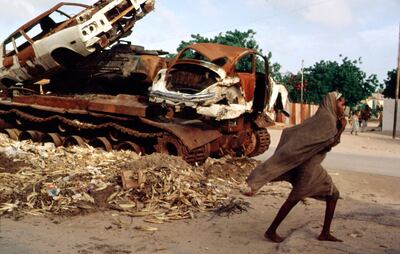
As tensions heightened and the war escalated in the early 2000s, the siblings' outside excursions were curtailed and Mahdi, who had applied for British visas and bought suitcases, put in motion a hitherto secret escape plan.
Ten-year-old JJ, forced to swelter in a coat in anticipation of the colder weather ahead, was taken in a packed eight-seater van to the airport for the 6,400km flight to London.
“We got told: ‘We have to move out.’ No time to tell anyone or sell the shop,” Roble says. “Dad gave it to a relative to look after.
“I remember thinking to myself, 'We're not coming back here for a long, long time'.”
Landing at Heathrow nine hours later was a shock. “Oh, my goodness, the place seemed massive. So many different people. Like there's white people, there’s Chinese people. I'm only used to seeing black people. One of my siblings reached out to touch someone’s bright blonde hair.
“I thought: ‘Wow, this is the real world.’”
First stop was Sudbury in north-west London for a few weeks with a relative, then a temporary hotel stay in Kilburn before they were allocated a council house in the shadow of the largest football stadium in the UK.
“Can you imagine?” she asks with an infectious laugh. “Wembley! We could see the stadium — the home of football — from our house. Just amazing. Something I’ll never forget.”
Roble had thought that only players or special fans were allowed into the hallowed grounds but she has since been twice: on a Chalk Hill Primary School trip (“I couldn’t imagine someone like me could go … It was surreal); and last summer when England's Lionesses beat Germany 2-1 in the European Championships final (“That was incredible”).
In their new garden, the serious rivalry resumed, one team captained by the oldest Roble sister, the other by the oldest brother, and a lemon or potato for a football.
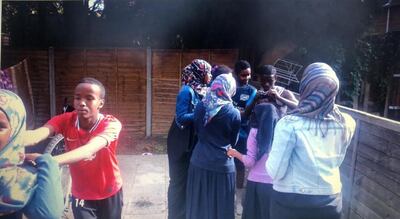
But, after much pleading, her parents soon handed over £3 ($3.69) for a coveted purchase that enabled JJ, who at that time spoke no English, to overcome the language barrier and fit in more quickly at school.
“Because the kid that has the ball gets the friends,” she explains, smiling. “The first words I learnt I think were, ‘pass, pass’ and ‘shoot!’”
The restrictive uniform of long black skirt, white shirt, school shoes and hijab did little to stop Roble from playing every spare minute, skipping breakfast and lunch to take to the field before lessons, in break times and after the final bell.
“Sometimes kids at primary school teased me. Teachers asked how I could play dressed like that. I was like, ‘This is it, this is what Muslim people wear. You have to be covered up.’
“My religion was not an issue. As long as you're just a nice person, they would accept you in the group. Being a Muslim is about being a good person, being modest and doing what makes you happy.”
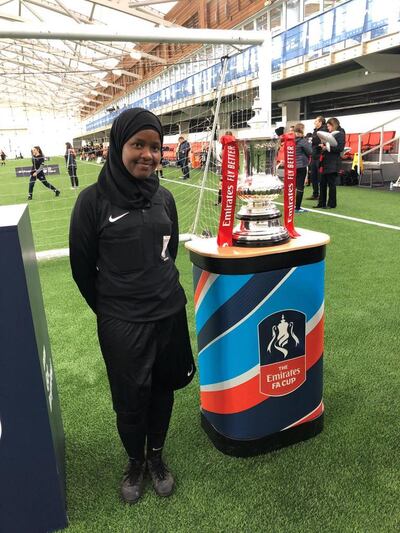
When a supportive PE teacher spotted how well Roble was performing in sports, the first seeds of discord were sowed with her parents who expressed a strong preference for their children to excel instead at maths and English.
“My dad actually sat me down and said: ‘You came all the way from Somalia, all the way from the war just so you can play football? We want you to make use of this country’s opportunities. At least learn to be something that can help other people, like a doctor.’”
But, in Roble's characteristically headstrong way, fulfilling her father’s ambitions was never a realistic outcome.
At 14, she thought the moment she had dreamt of had arrived. Players from Queens Park Rangers' women’s team visited the secondary school for a coaching session and to seek out talent for the club’s academy.
Roble put in the work, showing off her pace and left-footed skills in the attacking and defensive duties of a centre midfielder.
“I was one of four or five girls who got a letter inviting me to trial. I was so excited. I'm on the bus and I'm reading this letter over and over again. All that letter needed was a parent’s name and a signature.”
When she arrived home, however, her mother tore up the invitation in an act that even now, 15 years later, causes Roble pain to recount.
Heart-broken at her life’s ambition being thwarted, the resigned teenager eventually left school early to begin a design technology course at college.
While there, she took the level one and two coaching badges with Middlesex Football Association before a referee shortage led to her being asked to step in at the last minute, with no experience, to take charge of an under-sevens girls’ match.
“The parents were very nice to me and the girls said how nice it was to have a female referee. So, from that, I continued volunteering as a referee for a whole year at junior level.”
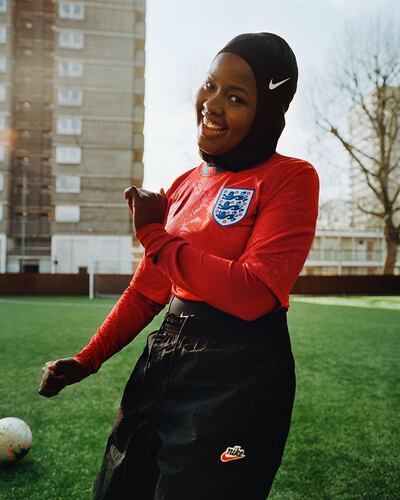
That prompted the FA to fund her formal referee training. “I said to myself: ‘I have to continue, get braver, do different leagues, different age groups.’ Next thing you know I'm doing men's and women’s. It happened so fast. Within four years, I was doing adult games.”
After joining the women’s pathway, Roble advanced to National League Level 3 and is now determined to progress to the Women’s Championship and Super League, and who knows where after that?
Along the way, she has garnered a clutch of accolades, including the FA Respect Match Official Award 2017 and being named on the BBC’s 100 Women 2019, as well as that MBE on the same honours list as the England head coach Sarina Wiegman, captain Leah Williamson, and players Lucy Bronze, Beth Mead and Ellen White.
When she’s not teaching at a special needs school in London, Roble dedicates herself to promoting inclusivity, defying stereotypes, demolishing barriers and clearing a path for future generations.
There are, she says, no limits to what can be achieved: “Only I can stop myself, and I'm not going to do that.”
Fitness is a priority, and she has also spent countless hours watching YouTube clips of professional referees such as the former Premier League's Mark Clattenburg to study their positioning during play and how they control the game.
Further inspiration came last November when an all-female on-field refereeing team led by Stephanie Frappart took charge of a men’s World Cup game for the first time in the match between Germany and Costa Rica.
Even her parents are coming around to their daughter's deep involvement with football, though Roble sounds as though she is meeting them halfway.
“I understand now that they wanted the best for me and to make sure I was protected and safe. They told me, 'We don't want any hatred towards you.’ I’ve told them it's not like that.
“At the end of the day, I'm spreading positivity. I'm sharing my sports journey with young girls, you know, who like me are interested in football. Maybe if they hear my story, they can use it to inspire them and have a shortcut instead of what I did.”
What she did, ultimately, was find the courage to tackle the norms within the Somali community and succeed on her own terms.
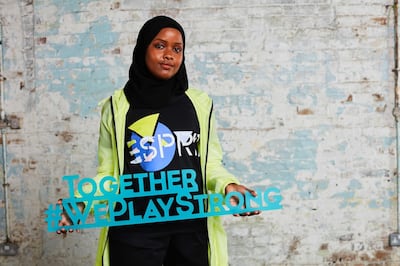
“My faith encourages sports, my faith encourages a healthy lifestyle,” Roble says. “I feel like [the issue] was more to do with cultural concerns. Because our culture says girls should be at home, not getting involved in men's sports. Girls should be shy, keep on the low, low. I’m sorry but that’s not me.
“I have challenged it. Now, in my Somali community, most of them are: 'Oh, wow, you're doing a great job.' And I’m like, 'So who was the problem? Do you have anything to say now?’”
It is the same toughness displayed when Roble encounters disbelieving looks from players and coaching staff as she walks to her happy place on the pitch or a decision is criticised.
As with all referees, she has received verbal abuse but says it’s nothing she can’t deal with. Despite her diminutive size, Roble's big personality, confidence and forthright retorts make for a commanding presence — and there is always the “power” of the red and yellow cards in her pocket.
Her story might have had moments of isolation, sometimes in the family setting and at least initially in an unfamiliar country as a refugee, but she seems undaunted by the “loneliness” of the referee presiding over two teams.
“I have accepted that,” Roble says of the latter. “Once I get on the pitch, I feel like everyone is my team. I feel totally free, like nothing else matters. There is no stress, nothing.
“I wanted to be a footballer so, in a way, I am kind of living that dream. It is where I belong.”
